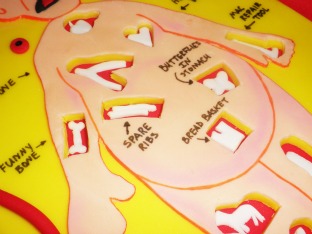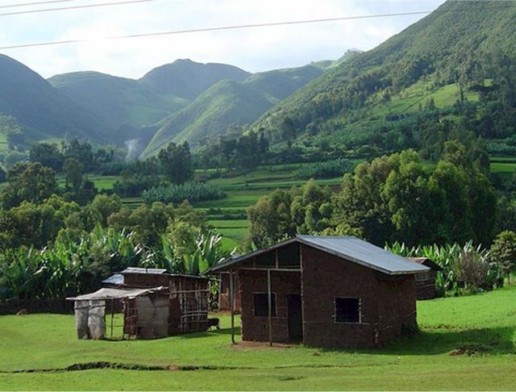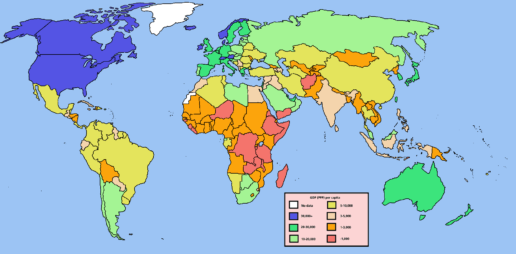What's Your Specialty?
At Soddo Christian Hospital, we offer all types of general and specialized care. Here's a sampling of specialized services that we offer at Soddo Christian Hospital:
- We have an outpatient department with an emergency room and non-urgent primary care. We see pediatric and adult patients. Our general medical staff includes a US-trained pediatrician, emergency physician, family nurse practitioner, and tropical disease expert. We have a European-trained geriatrician, as well as a national internal medicine specialist who sees clinic patients and inpatients.
- We have two, that's right TWO, US-trained general and trauma surgeons. They serve as the primary faculty advisors for the general surgery residency program at the hospital. (Yes, we are a teaching hospital affiliated with the Pan-African Academy of Christian Surgeons). This team performs other surgeries as well including a fair amount of urologic procedures.
- Orthopedic Surgery - we have a US-trained orthopedic surgeon and perform a full gamut of bone and joint surgeries with pediatric and adult patients, including arthroscopic surgery!
- Obstetrics & Gynecology - our US-trained obstetrician and team of midwives perform deliveries and C-sections as well as expert gynecology services.
- Subspecialties are available on an occasional basis. Through World Medical Mission, we have plastic surgeons, ENT (ear, nose & throat), urologists, and neurosurgeons come and work in Soddo on a frequent basis.
As you can see, we are well staffed to take care of all types of emergent and non-emergent conditions!
Where is Soddo Anyway?
We get asked this question a lot, so we thought we'd show you. Here is a map of Ethiopia:
As you can see, the capital city Addis Ababa is located smack in the middle of the country. If you visit Soddo, this is where you will fly into, usually from Europe, or maybe Washington, D.C. From the southwest edge of Addis, you head south on the Jimma Road, and right outside of Addis, turn left down the highway that takes you to Soddo. Here's the route:
From Addis, it's about a 330 km, or about 205 miles to Soddo. You pass through 2 major towns, Butajira at around 100km (you're about one-third of the way there) and Hosanna at around 200km (now you're on the home stretch). The journey takes about 5 hours. Often folks will stop for lunch or coffee - we recommend the Rediet Hotel in Butajira. Along the way, expect to see some beautiful rolling countryside, farmland, and Ethiopia chika bets, or mud houses.
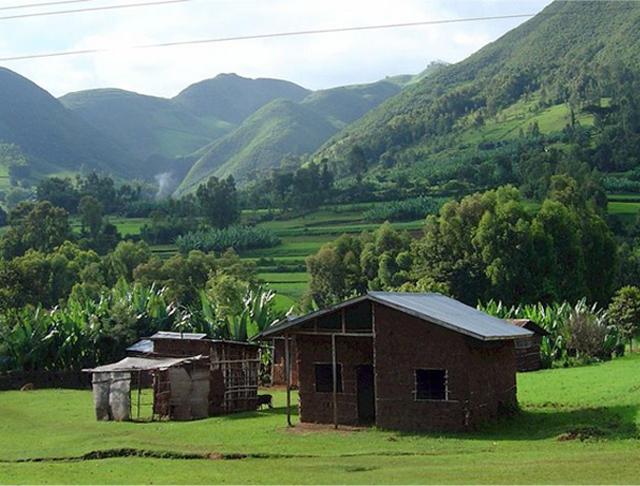
The big towns, like Hosanna and Butajira, are full of retail stores, restaurants, and hotels. When in the towns you will see 3-wheeled motorized tuk-tuks that are referred to as a "Bajaj" after the Indian company that makes them. Here's a couple photos:


And, of course, expect to see plenty of donkeys, donkey-carts, and pedestrians occupying the road as you travel. In fact, many more people on the road in Ethiopia are on foot than in cars!

Sustainability, Mission Hospitals, & the Early Church
How do you do medical missions in a sustainable way? Medical care is expensive, and providing it to the poorest of the poor is financially implausible. And yet, those with a Christian worldview know that God commands us to "act justly and to love mercy" (Micah 6:8). Basic economics teaches us that doing so will come at a cost. And who is to bear that cost? Well, we learn in Acts 4:32-35 that the early Church had a good solution for this. They were sharing their possessions with each other "as they had need." This may be the reason (according to Rodney Stark and others) that the early church grew in such an explosive fashion. As new Christians met the needs of others in the Body, the world was watching. This kind of selfless compassion was contagious, and new followers were added to their numbers daily.
The map shows the per capita GDP (gross domestic product - a measure of economic output) across the globe. North America and a handful of Western European countries represent the wealthiest. Ethiopia and other Sub-Saharan African countries the poorest. We find members of the body of Christ in all of these places without respect to political boundaries. If you live in a "blue" or a "green" country, do you feel a new weight of responsibility? So, as Francis Schaeffer famously asked, "How should we then live?"
Soddo Christian Hospital does not provide care for free. Some mission hospitals do, but ours charges a small fee. We believe this to be important to the longstanding sustainability of the hospital. (That's another post for another day.) But that alone is not sufficient to run a hospital. We have pledged as an institution to offer "excellent medical services," and that we intend to do. But the economy in which we work is not able by itself to support this lofty vision.
And so we turn to you. We need your help. We need the Body of Christ in the "blue and green countries" to step up and say, "We'll take care of it." Someday, we hope that the economy in rural Ethiopia will be booming, and will fund the hospital fully. But until then, we know others will have to stand in the gap. Is that sustainable? Well, perhaps it is, and perhaps it isn't. If you have thoughts on the subject, we invite you to comment below.
96% means 96 cents on every dollar donated goes to the Hospital in Ethiopia
Not many charities can claim this, but we promise you 96% of the money you donate will go directly to Soddo Christian Hospital in Ethiopia and our patients. How do we do that? Here are five ways:
- All of our medical missionaries are supported through partner mission sending agencies. That means that they raise their own support, and the hospital does not pay them. So, none of your donated dollars will go to pay salaries of our expatriate staff.
- Our US and Europe-based advocates are all volunteers. All of our board members, and the people who do the work on the hospital from outside Ethiopia are not paid. You can rest assured that your donation is going where it's needed - not to pay our admins.
- Of course we have costs as a non-profit. Things that are unavoidable like postage for our newsletters or wire transfer fees to get the money to Ethiopia.
- The hospital charges patients a very small fee. (Except for the very poor - for them, see point #5). These patient fees go to pay for the electric bill and a lot of the day-to-day operations of the hospital. So you aren't contributing to the utilities. So what are you giving to? Well, that leads us to our last point...
- The donations we receive go directly to pay for care for the poorest of the poor, and to help us build new wards, patient facilities, and equipment that we need to care for the patients. We have a Benevolent Fund which pays for our poorest patients, and a significant portion of your donations go to that. Another portion goes to provide equipment that the hospital needs like an ambulance, or a piece of lab equipment. And lastly, some of the money goes to build more beds and more space for more patients.
Doesn't it feel good to know that your money is going to the place where it's most needed? We think so - that's why we do it this way. You can give today and help us keep providing excellent care and proclaiming the Gospel in Ethiopia!
Does a mission hospital treat everyone?
This is a question that we get asked a lot. So we wanted to address it. And the answer is... yes!
Our hospital is a mission hospital. You can read all about our mission and values here. But suffice it to say, that we exist not just to treat people with excellent medical care, but to proclaim the Gospel of Jesus Christ and make disciples.
But do we treat anyone who comes in the door, no matter what their faith or background? Of course we do! We are proud to serve the people of this part of Ethiopia. Fortunately, as our reputation has grown, now we are also seeing patients referred to us from all over the country. And these patients come from all types of backgrounds. Some are Ethiopian Orthodox, some are Muslim, some are animistic, and some are Protestant. We see and treat them all.
In the hospital, our staff will offer to pray with patients regardless of their background. We believe that a person's health should be attended to physically and spiritually. We find that our patients really respond to the fact that we care about them in this wholistic manner.
Often, if a patient is open to hearing about it, we will share with them the life-giving message of the Gospel. We don't force it. But we do give them the opportunity to hear. We play the Jesus Film in the hospital. We will often provide a Bible in Amharic. By God's grace, we have seen over 500 patients profess faith in Christ since the hospital opened its doors. But even for those that kindly decline, we aim to provide excellent care just the same.
Welcome to the Blog!
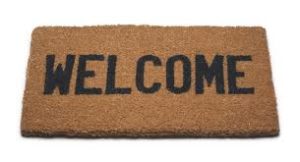 Welcome to the Soddo Christian Hospital blog! We hope that this will be a place for you to hear from our staff on various goings-on at the hospital and in the area of medical missions. Here are 5 things we hope to achieve with this blog:
Welcome to the Soddo Christian Hospital blog! We hope that this will be a place for you to hear from our staff on various goings-on at the hospital and in the area of medical missions. Here are 5 things we hope to achieve with this blog:
- Tell amazing stories - There’s a lot going on here in Soddo! There are patients being healed physically from longstanding infirmities, staff members growing in their faith, and long term missionaries serving alongside and training nationals. We want to tell you all about it!
- Answer your questions - What do you want to know about the hospital? About missions in Africa? About Ethiopia? Ask us questions. You can email us at blog@soddo.org or go to our Facebook page, and put your question there.
- Introduce you to some incredible people – We have some devoted, compassionate staff we’d love for you to meet. Some are Ethiopian, and some are expatriates. All are providing quality medical care in the name of Jesus Christ. We would love to tell you more about them.
- Show how your donations are making a difference – Through your generous giving, we are building new buildings, getting state-of-the-art medical equipment, providing Bibles to patients, subsidizing surgeries and care for the poorest of the poor, and all sorts of other amazing things. We want to give you feedback on all of it.
- Be a resource for you – Do you have friends interested in medical missions? Do you know someone who is considering a career as a medical missionary? Maybe you need some information on health in Ethiopia. We are here on the front lines, and we want to give you information that you can use.
Thanks for stopping by!

